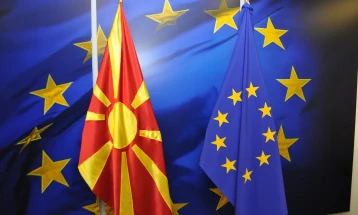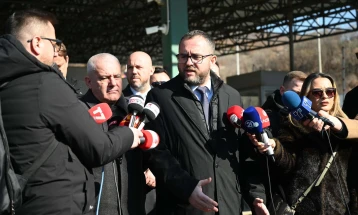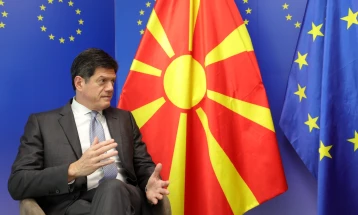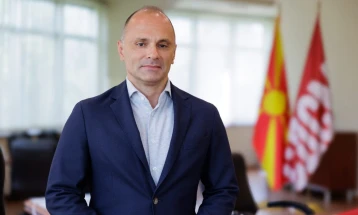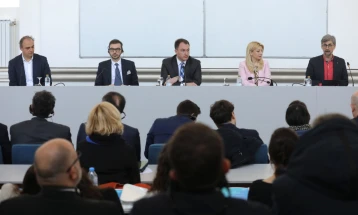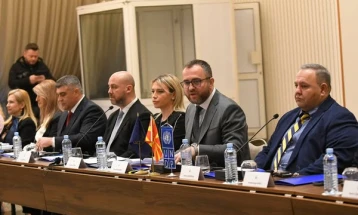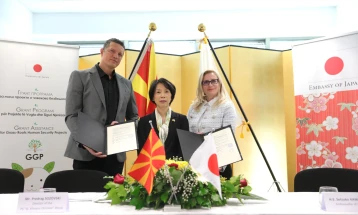Mickoski in Washington: We don't want negotiations with EU to turn into never-ending story, constitutional changes when we complete negotiations
- "We, as a nation, did everything we could. Parctically, we suffered a lot of humiliations, we accepted a lot of bad deals on behalf of the European perspective, but also to become a full-fledged member of NATO," PM Mickoski said at an Atlantic Council event in Washington on the future of transatlantic relations in the Western Balkans.
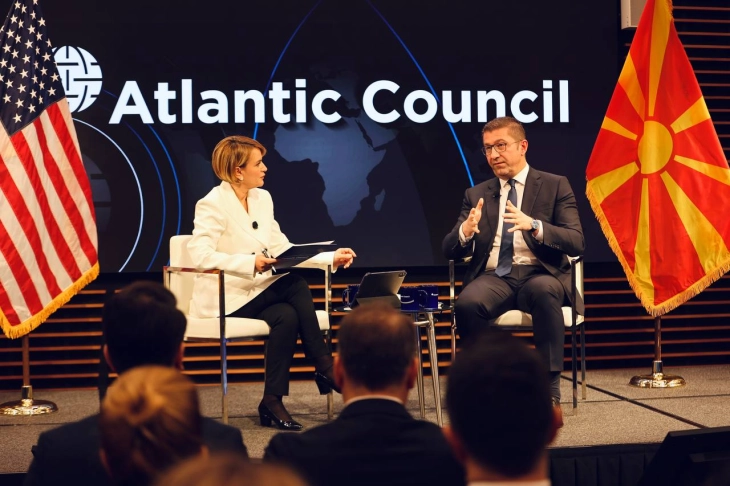
Skopje, 21 February 2025 (MIA) - Prime Minister Hristijan Mickoski believes that as a nation we have suffered a lot of humiliations, and accepted bad deals on behalf of higher goals for Euro-Atlantic integration, and the country is not even at the beginning of the path to EU membership. Now, he says, we are being asked to make constitutional changes again, but that still does not guarantee certainty on the European integration path.
"We, as a nation, did everything we could. Parctically, we suffered a lot of humiliations, we accepted a lot of bad deals on behalf of the European perspective, but also to become a full-fledged member of NATO," PM Mickoski said at an Atlantic Council event in Washington on the future of transatlantic relations in the Western Balkans.

Frustration among the citizens of my country, Mickoski added, is extremely big.
"I witnessed, at the time we were in the opposition, it was 2018, a lot of people from all over the world visited us, a lot of EU high officials, prime ministers of very powerful nations and countries, presidents as well, members of EU Commission visited us, and they said - just change your name this time and since you are frontrunners immediately you will become a part of NATO, you will start negotiations with the EU and you will end negotiations within a period of four or five years, and you will become a part of the EU. Those four or five years expired two years ago, and we are in the same situation where we were twenty years ago, but in the meantime we changed our flag, Constitution, currency, name and everything," said PM Mickoski.
And now again, he pointed out, we have a hurdle in front of us, we have to change our Constitution again and that does not guarantee certainty on the European integration path.

"Tell me a second example in Europe which is similar to ours, and I'm not saying closely similar to ours. This time we said, look, if Pacta sunt servanda is applicable for us, then it should be applicable for all. If we can deliver, then we are expecting the others to deliver as well," Mickoski said.
He noted that that's why he was travelling all around the globe now, to spread a little bit the story about Macedonian destiny, which he said was something that is a role model of double standards.
"We have to bring a couple of hundreds of our citizens in our Preamble, as a constitutional part of the Preamble, which is a descriptive part of our Constitution. We are talking about Bulgarian community. In our Constitution we have Macedonians, Albanians, Serbs, Turks, Bosniaks, Vlachs, so if you're analysing things from that point of view, it would not be a big deal. But why we should bring them to the Preamble? Maybe we are talking about human rights, maybe someone is violating Bulgarian community human rights? Who are we politicians to judge whether someone's human rights have been violated? There is an institution in Europe called Strasbourg Human Rights Court, which is responsible to judge whether someone's human rights have been violated or not. And what that institution said in the past couple of years? They were very clear, saying that 14 times human rights of Macedonian community in Bulgaria have been violated, and 0 times for the Bulgarian community in my country. Fourteen to zero. Then, I'm wondering, how can we explain this to the citizens, they will ask us, and it is a normal question - why we are doing this, and they are delivering nothing. That's why we said, since this is not something that is crucial, because negotiations means strengthening institutions, improving capacity of the institutions, not solving bilateral issues. We said, okay, we will finish this but when we will end our negotiations, because we fear that this might convert into a never-ending story, and there will be additional requests and no one knows when all of this will end," PM Mickoski told the event in Washington organized by the Atlantic Council.

PM Mickoski also noted that when we are talking about EU perspective, then we should talk about common shared values, about AI, about good environment, economy, better education, good healthcare, agriculture, tourism, etc., and not about something that happened in the Middle Age. According to him, Balkanization of Europe is a problem, because if we are misusing Brussels institutions for solving bilateral issues, it is not a part of our common shared values, and it is not a part of the idea of De Gasperi, Schuman and Adenauer, founders of the EU community, the Government said in a press release.
Photo: Government
